How to get a pigeon to trust you? This question arises from the desire to connect with these remarkable birds, known for their intelligence, grace, and distinctive cooing calls. With their long history of coexisting with humans, Pigeons possess a natural wariness and self-preservation instinct.
However, gaining their trust is not an impossible task. Understanding the behaviour of pigeons and employing the right approach can foster a bond built on mutual trust and respect. In this article, we will explore the fascinating world of pigeons, their social structure, and their instinctual behaviours.
Furthermore, we will delve into practical strategies for creating a positive environment, developing a feeding relationship, and gradually building trust through patience, observation, and respectful interactions.
Following these guidelines, you can embark on a rewarding journey of connecting with these beautiful creatures and forming a lasting trust-based bond.
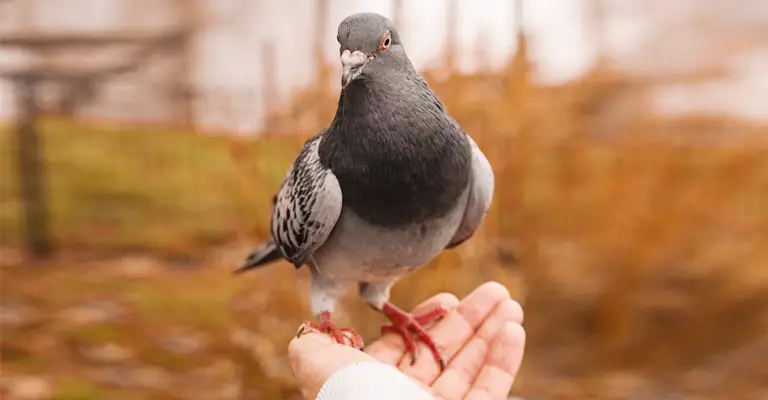
How To Get A Pigeon To Trust You?
If you’ve ever wondered, “How to get a pigeon to trust you?” you’re not alone. Building trust with pigeons requires understanding their behaviour and employing the right strategies.
Pigeons are intelligent creatures with a natural wariness. Still, you can establish a bond built on trust with patience and the right approach. Here are some effective methods to gain a pigeon’s confidence.
Understanding Pigeon Behavior
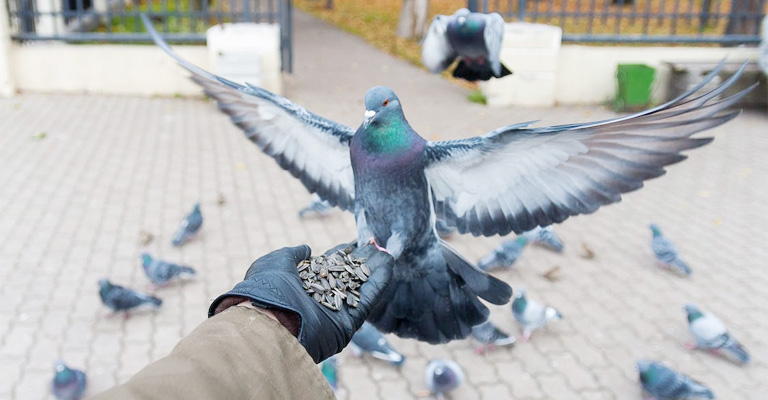
Pigeons are fascinating birds known for their ability to navigate long distances and adapt to various environments. To understand their behaviour, exploring their communication and body language, instinctual behaviours, and social structure within flocks is essential.
Pigeon Communication And Body Language:
Pigeons communicate through vocalizations, body movements, and visual cues. They use cooing sounds, clapping wings, and puffing up their feathers to convey messages to other pigeons.
Body language such as head bobbing, bowing, and tail wagging also play a significant role in their communication.
Instinctual Behaviours And Natural Tendencies:
Pigeons exhibit a range of instinctual behaviours deeply ingrained in their biology. These include homing instincts, mate selection and courtship rituals, nest building, and parental care.
Their ability to navigate and find their way back home, even over long distances, is a remarkable trait associated with their natural tendencies.
Social Structure And Hierarchy Within Pigeon Flocks:
Pigeon flocks have a complex social structure with hierarchies. They form cohesive groups based on kinship, familiarity, and dominance. Dominant pigeons establish their authority through aggressive displays and postures, often asserting their access to resources such as food and shelter.
Subordinate pigeons may exhibit submissive behaviours, such as avoiding eye contact and yielding to higher-ranking individuals.
Creating A Positive Environment
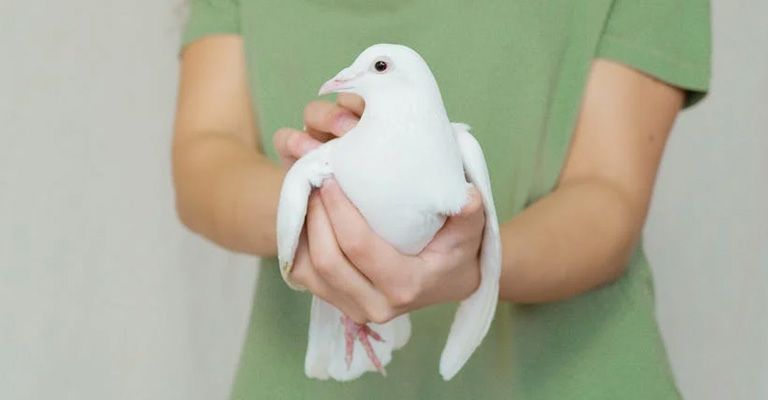
Creating a positive environment is crucial for the well-being and contentment of individuals or animals. It involves providing a safe and comfortable space, offering a consistent food and water source, and establishing a routine while maintaining consistency.
Providing A Safe And Comfortable Space:
Ensuring a safe and comfortable space is essential to foster a positive environment. This includes removing any potential hazards or dangers that could cause harm.
Providing adequate shelter, temperature control, and suitable bedding or resting areas contributes to the comfort and security of individuals or animals.
Offering A Consistent Food And Water Source:
Maintaining a consistent food and water supply is fundamental to creating a positive environment. Access to nourishing meals and clean, fresh water promotes overall health and well-being.
Regular feeding times and ensuring access to food and water throughout the day are essential factors to consider.
Establishing A Routine And Maintaining Consistency:
Establishing a routine and maintaining consistency helps create a sense of stability and predictability. This can be particularly beneficial for individuals or animals who thrive on structure.
Consistency in daily activities, such as feeding times, exercise, and social interactions, can reduce stress and anxiety, promoting a positive environment.
Encouraging Social Interaction And Companionship:
Humans and animals alike benefit from social interaction and companionship. Providing opportunities for socialization with others can foster positive relationships, reduce feelings of loneliness or isolation, and promote mental and emotional well-being.
This can be achieved through group activities, playtime, or regular social interactions with compatible individuals or animals.
Stimulating The Environment:
Creating a stimulating environment enriches the lives of individuals or animals. Offering various mental and physical stimulation forms, such as toys, puzzles, or games, can prevent boredom and promote engagement.
Environmental enrichment encourages curiosity, exploration, and the development of new skills, leading to a positive and fulfilling experience.
Maintaining Cleanliness And Hygiene:
A clean and hygienic environment is essential for the well-being of individuals or animals. Regular cleaning and sanitation practices help prevent the spread of diseases, promote good health, and contribute to a positive atmosphere.
This includes cleaning living areas, properly managing waste, and ensuring personal hygiene practices.
Patience And Observational Skills
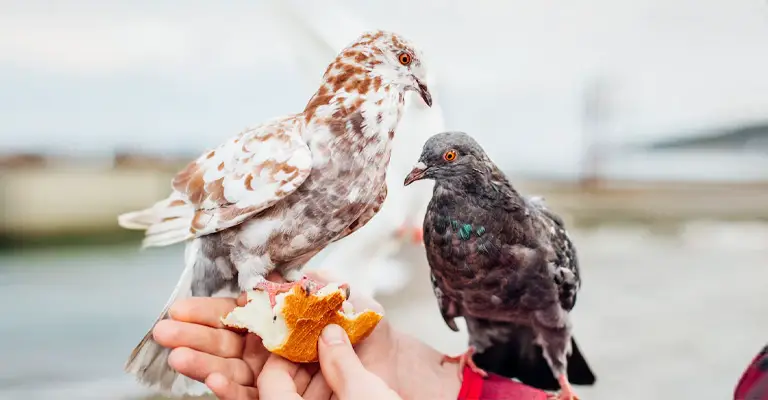
Patience and observational skills are crucial when building trust with pigeons. By understanding their behaviour and preferences and recognizing signs of discomfort or fear, we can create a safe and comfortable environment for these birds.
Importance Of Patience In Building Trust:
Patience is vital when working with pigeons. These birds are sensitive and can be easily startled. Rushing the process may lead to fear or mistrust. By establishing a calm and relaxed atmosphere, we can gradually build trust and develop a positive relationship with the pigeons.
Observing Pigeon Behaviour And Individual Preferences:
Each pigeon has its unique behaviours and preferences. Observing their interactions, body language and reactions to stimuli can provide valuable insights into their personalities. Some pigeons may enjoy certain types of food or prefer specific perching spots.
Understanding these individual preferences allows us to tailor our approach and create a more enjoyable and trusting environment for the pigeons.
Recognizing Signs Of Discomfort Or Fear:
It is essential to be attentive to signs of discomfort or fear displayed by pigeons. These can include flapping wings, cowering, cooing anxiously, or attempting to retreat.
By being observant, we can identify situations or stimuli that cause distress and take appropriate steps to alleviate their discomfort. This may involve adjusting the environment, removing stressors, or using positive reinforcement to create a sense of safety and trust.
Building Trust Through Consistency And Positive Reinforcement:
Consistency is vital in building trust with pigeons. Establishing a routine and sticking to it helps pigeons feel secure and familiar with their surroundings.
Positive reinforcement techniques, such as rewarding desired behaviours with treats or praise, can reinforce trust and encourage pigeons to engage in desired activities or interactions.
Patience And Observational Skills In Training And Socialization:
Patience and observational skills are essential during training and socialization processes. Pigeons can learn a variety of tasks and behaviours through positive reinforcement and repetition.
We can understand their learning pace and adjust training techniques by patiently observing their progress. This ensures effective communication and a strengthening bond between pigeons and humans.
Building Trust Through Bonding
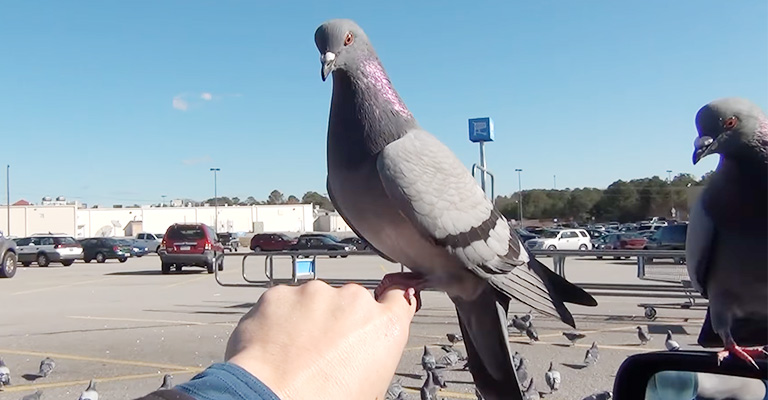
Building trust with pigeons requires patience and respect for their instincts. This section focuses on three key strategies to foster a bond with these birds: spending time nearby without intruding, gradually reducing their flight responses, and using clear and reassuring body language.
Spending Time Near The Pigeons Without Intruding
To begin the bonding process, spend time near the pigeons without making any sudden movements or loud noises that might startle them. Choose a comfortable spot at a distance where they can see and get accustomed to your presence.
By avoiding direct intrusion, you allow the pigeons to become familiar with you in a non-threatening manner.
Slowly Gaining Proximity And Reducing Flight Responses
As the pigeons grow more comfortable with your presence, the distance between you and them gradually decreases. Move slowly and avoid sudden gestures.
If the birds exhibit signs of nervousness or flight responses, step back and allow them to regain their composure. With patience and consistency, they will become more tolerant of your proximity.
Using Calm And Reassuring Body Language:
Body language plays a crucial role in building trust with pigeons. Adopt a calm and relaxed posture while near them. Avoid making direct eye contact, as it might be perceived as threatening.
Instead, blink slowly or avert your gaze to signal that you mean no harm. Offer gentle movements and avoid any aggressive actions that could disrupt the bonding process.
Offering Treats And Positive Reinforcement:
To reinforce positive associations, occasionally offer treats like birdseed or grains. Toss the treats gently and allow the pigeons to approach them at their own pace. Over time, they will associate your presence with positive experiences, further solidifying the bond of trust.
Consistency And Patience:
Building trust with pigeons is a gradual process that requires patience and consistency. Visit the exact location regularly and maintain the same calm and reassuring demeanour each time.
Avoid sudden changes in behaviour that might unsettle the birds. As they become more familiar with your presence, they will be more likely to accept you as a non-threatening presence in their environment.
Respecting Individual Boundaries:
Not all pigeons will respond similarly, as they have distinct personalities and comfort zones. Respect their boundaries and avoid forcing interaction if a pigeon seems hesitant or uncomfortable. Each bird will have its own pace of trust-building, so it’s essential to recognize and accommodate these differences.
Developing A Routine

Establishing a consistent routine is essential for the well-being and development of individuals. This section focuses on the importance of training in three key aspects: feeding times, patterns and interactions, and building trust through reliable behaviour.
Establishing Consistent Feeding Times:
Maintaining regular feeding times helps create a sense of security and predictability for infants and animals. By adhering to a schedule, individuals can anticipate and rely on nourishment at specific intervals, promoting healthy growth and reducing anxiety associated with uncertainty.
Offering Predictable Patterns And Interactions:
Consistency in patterns and interactions fosters a sense of stability and comfort in relationships. By engaging in predictable activities or behaviours, such as reading bedtime stories or sharing daily meals, individuals can build a stronger bond and understanding with others, promoting trust and emotional well-being.
Building Trust Through Reliable And Predictable Behaviour:
Reliability is a fundamental aspect of trust-building. Individuals demonstrate their dependability and integrity by consistently following through on commitments, being punctual, and keeping promises.
This behaviour instils confidence in others, deepening trust and strengthening relationships.
How long does it take for a pigeon to trust you?
Building trust with a pigeon can be a gradual process that requires time and patience. The duration for a pigeon to trust you may range from seven days to as long as one month.
It is crucial to approach them calmly, avoiding sudden movements that might startle them. Offering food can help create a positive association and encourage the pigeon to become more comfortable in your presence.
Consistency is key in gaining their trust, so spending regular time near the pigeon, offering food and speaking softly, will gradually establish familiarity and trust.
It’s essential to allow the pigeon to approach you at its own pace and avoid any attempts to force interactions. By demonstrating a consistent and gentle presence, you can foster a sense of trust and companionship with the pigeon over time.
FAQs
Pigeons have shown the ability to recognize individual humans based on their appearance and behaviour. They can distinguish between friendly and threatening individuals.
The time it takes to gain a pigeon’s trust varies depending on several factors, including the bird’s prior experiences and natural disposition. It can take a few days to several weeks or even months.
Pigeons are attracted to grains, seeds, and bird feed. Offering these food items consistently can help build trust and strengthen the bond between humans and pigeons.
It is generally advised not to attempt touching or handling pigeons, which can cause distress or harm to the birds. Focus on establishing trust through positive reinforcement and a non-threatening presence.
Pigeons can be trained to respond to specific commands, but it requires time, patience, and expertise in bird training techniques. Consulting with an avian behaviour specialist can provide valuable guidance in this regard.
Conclusion
Building trust with pigeons is a rewarding endeavour that enhances our connection with the natural world. We can forge a meaningful bond with these remarkable birds by understanding their behaviour, creating a safe environment, employing positive reinforcement, and maintaining consistency.
Remember, patience and respect are the foundations upon which trust is built. As we learn to coexist harmoniously, we can appreciate the beauty and intelligence of pigeons while deepening our understanding of the avian world.